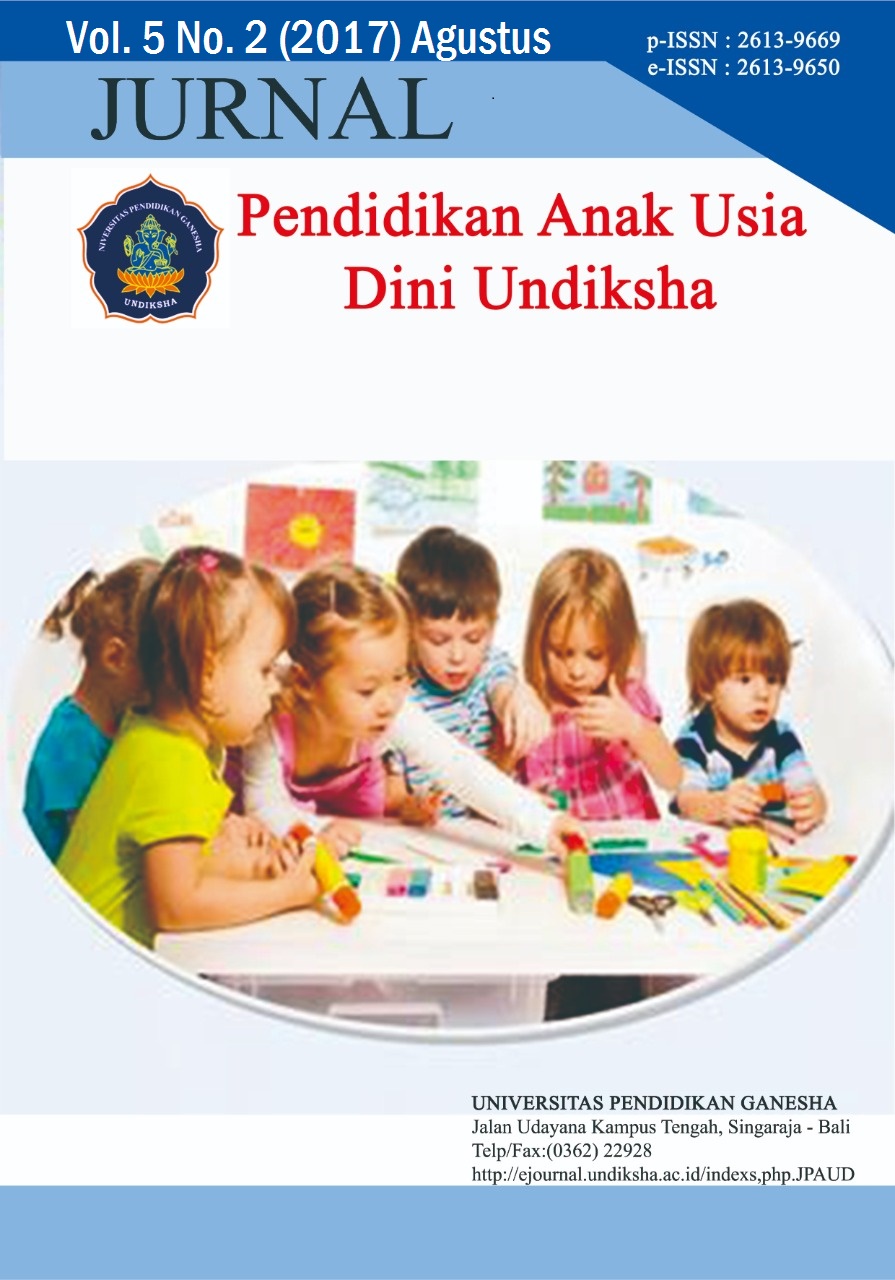PENGARUH METODE BERMAIN BERBANTUAN GOBAG SODOR TERHADAPKEMAMPUAN BEKERJASAMA ANAK KELOMPOK A DI TK GUGUS MAWAR KECAMATAN DENPASAR UTARA TAHUNPELAJARAN 2016/2017
DOI:
https://doi.org/10.23887/paud.v5i2.11680Abstract
Penelitian ini bertujuan untuk mengetahui perbedaan yang signifikan kemampuan bekerjasama antara kelompok anak yang dibelajarkan melalui metode bermain berbantuan gobag sodor dengan kelompok anak yang dibelajarkan secara konvesional pada anak kelompok A TK Gugus Mawar Kecamatan Denpasar Utara Tahun Pelajaran 2016/2017. Penelitian ini merupakan penelitian ekperimen semu dengan desain penelitiannya adalah Non equivalent Control Group Design. Populasi dalam penelitian ini anak kelompok A TK Gugus Mawar Kecamatan Denpasar Utara. Untuk menentukan sampel digunakan random sampling. Sampel dalam penelitian adalah anak kelompok A TK Negeri Pembina Kecamatan Denpasar Utara sebagai kelas eksperimen dan anak kelompok A Dharma Praja Denpasar Utara sebagai kelompok kontrol. Pengumpulan data hasil kemapuan bekerjasama dilakukan dengan metode observasi berbantuan checklist. Data di analisis menggunakan analisis statistik uji-t. Hasil penelitian menunjukkan bahwa terdapat perbedaan yang signifikan hasil kemampuan bekerjasama antara kelompok anak yang dibelajarkan melalui metode bermain berbantuan gobag sodor terhadap kemampuan bekerjasama dengan kelompok anak yang dibelajarkan secara konvesional. Hal ini terbukti dari analisis dengan menggunakan uji-t diperoleh thitung = 11,38 > ttabel (ά = 0,05) = 2,021. Selain itu nilai rata-rata kelompok anak yang dibelajarkan melalui metode bermain berbantuan gobag sodor terhadap kemampuan bekerjasama X ̅ ̇ = 86,85 > X ̅ ̇ = 67,15 kelompok anak yang dibelajarkan secara konvesional. Dengan demikian dapat disimpulkan bahwa Metode Bermain Berbantuan Gobag Sodor terhadap Kemampuan Bekerjasama berpengaruh terhadap anak kelompok A TK Negeri Pembina Denpasar Utara Tahun Pelajaran 2016/2017.Kata Kunci : metode bermain, gobag sodor, kemampuan Bekerjasama
This study aims to determine significant differences between groups of children collaboration capabilities that learned through play-aided method gobag Sodor with a group of children that learned are conventional in kindergarten cluster A group of children Mawar North Denpasar District Academic Year 2016/2017. This study is a quasi experimental research with the research design is non-equivalent control group design. The population in this study is children of group A TK Gugus Mawar, North Denpasar District. To determine the sample used random sampling. The sample in this research is children of group A TK Negeri Pembina Kecamatan Denpasar Utara as experimental class and child group A Dharma Praja Denpasar Utara as control group. Traffic data collection results in cooperation conducted using assisted observation checklist. Data were analyzed using t-statistical analysis. The results showed that there were significant differences between the results of collaboration capabilities that learned through a group of children playing aided method gobag Sodor to the ability to cooperate with the group of children that learned are conventional. This is evident from analysis using t-test obtained t = 11.38> t table (ά = 0.05) = 2.021. In addition the average value of a group of children that learned through play-aided method gobag Sodor to the ability to cooperate = 86.85> = 6 7.15 dibelajarkan groups of children who are conventional. It can be concluded that the method of Assisted Gobag Play Sodor to affect the child's ability to Cooperate A group of North Denpasar Pembina State kindergarten in the school year 2016/2017.
keyword : method of playing, gobag Sodor, collaboration capabilities
Downloads
Published
2017-07-31
How to Cite
., N. K. D. K., ., D. I. B. S. M. M., & ., D. I. W. D. (2017). PENGARUH METODE BERMAIN BERBANTUAN GOBAG SODOR TERHADAPKEMAMPUAN BEKERJASAMA ANAK KELOMPOK A DI TK GUGUS MAWAR KECAMATAN DENPASAR UTARA TAHUNPELAJARAN 2016/2017. Jurnal Pendidikan Anak Usia Dini Undiksha, 5(2), 178–188. https://doi.org/10.23887/paud.v5i2.11680
Issue
Section
Articles
License
Authors who publish with the Jurnal Pendidikan Anak Usia Dini Undiksha agree to the following terms:
- Authors retain copyright and grant the journal the right of first publication with the work simultaneously licensed under a Creative Commons Attribution License (CC BY-SA 4.0) that allows others to share the work with an acknowledgment of the work's authorship and initial publication in this journal.
- Authors are able to enter into separate, additional contractual arrangements for the non-exclusive distribution of the journal's published version of the work (e.g., post it to an institutional repository or publish it in a book), with an acknowledgment of its initial publication in this journal.
- Authors are permitted and encouraged to post their work online (e.g., in institutional repositories or on their website) prior to and during the submission process, as it can lead to productive exchanges, as well as earlier and greater citation of published work. (See The Effect of Open Access)











